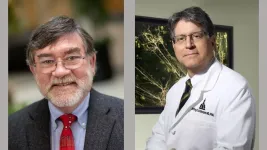(Press-News.org) SAN ANTONIO, Oct. 21, 2024 – Patrick Sung, DPhil, director of the Greehey Children’s Cancer Research Institute and associate dean for research at The University of Texas Health Science Center at San Antonio (UT Health San Antonio) is the latest recipient of the 2024 Basser Global Prize.
A leading researcher in the field of DNA damage repair and cancer biology, Sung has been awarded the prestigious prize for his groundbreaking contributions in elucidating the DNA repair functions of the BRCA1 and BRCA2 genes. The award recognizes Sung’s contributions in advancing the knowledge of these critical genes and their implications for hereditary breast and ovarian cancer.
Presented by the Basser Center for BRCA at the Abramson Cancer Center of the University of Pennsylvania, the Basser Global Prize recognizes a leading scientist each year who has advanced BRCA1 and BRCA2-related research. Individuals with mutations in the BRCA1 and BRCA2 genes are at an increased risk of breast, ovarian, pancreatic and prostate cancers.
“I am deeply honored to be recognized by the Basser Center,” said Sung, professor of biochemistry and structural biology at the Joe R. and Teresa Lozano Long School of Medicine at UT Health San Antonio. “This recognition reflects the power of collaboration and innovation. It inspires us to continue our mission in advancing cancer care and better outcomes for patients living with cancers caused by BRCA1 and BRCA2 mutations.”
Sung will receive the award at the 13th annual Basser Center Scientific Symposium on April 22-23, 2025, where he will give the keynote address.
"Congratulations to Dr. Sung for receiving this well-deserved honor,” said Robert Hromas, MD, FACP, acting president of UT Health San Antonio. “This recognition is a testament to his outstanding work in the mechanistic dissection of BRCA1 and BRCA2 functions, driving significant advancements in understanding and treating cancers associated with BRCA gene mutations.”
Sung holds a Robert A. Welch Distinguished Chair in Chemistry and is the recipient of an Outstanding Investigator Award from the National Cancer Institute. He is also the Principal Investigator of a multi-institutional Program Project Grant from the National Cancer Institute. Sung is a Cancer Prevention and Research Institute of Texas (CPRIT) Established Investigator, a role that underscores the importance of leadership and commitment to advancing cancer research and prevention efforts within Texas and beyond.
“We are proud of the tremendous work Dr. Sung has made in BRCA1/2 and DNA repair research,” said Lei Zheng, MD, PhD, executive director of Mays Cancer Center at UT Health San Antonio. “His contributions not only deepen our understanding of cancer biology but are also leading to more effective treatments for patients. This prestigious recognition highlights the global impact of Dr. Sung’s accomplishments.”
The Basser Global Prize offers $100,000 in unrestricted funding for the recipient's research related to BRCA1 and BRCA2, along with a Basser sculpture and a personal prize of $10,000, which will be presented at the symposium.
The University of Texas Health Science Center at San Antonio (UT Health San Antonio) is one of the country’s leading health science universities and is designated as a Hispanic-Serving Institution by the U.S. Department of Education. With missions of teaching, research, patient care and community engagement, its schools of medicine, nursing, dentistry, health professions, graduate biomedical sciences and public health have graduated more than 43,886 alumni who are leading change, advancing their fields and renewing hope for patients and their families throughout South Texas and the world. To learn about the many ways “We make lives better®,” visit UTHealthSA.org.
Stay connected with The University of Texas Health Science Center at San Antonio on Facebook, Twitter, LinkedIn, Instagram and YouTube.
The Mays Cancer Center at UT Health San Antonio is one of only four National Cancer Institute-designated Cancer Centers in Texas. The Mays Cancer Center provides leading-edge cancer care, propels innovative cancer research and educates the next generation of leaders to end cancer in South Texas. To learn more, visit https://cancer.uthscsa.edu.
Stay connected with the Mays Cancer Center on Facebook, Twitter, LinkedIn, Instagram and YouTube.
The Greehey Children’s Cancer Research Institute is one of only two institutes in the United States dedicated solely to pediatric cancer research. With its 20 laboratories, researchers are focusing on cancer genomics, DNA repair, RNA biology and drug development for new and less-toxic treatments for childhood cancers.
END
UT Health San Antonio world-renowned expert in BRCA research to be honored for global contributions
2024-10-21
ELSE PRESS RELEASES FROM THIS DATE:
NYU Tandon School of Engineering and KAIST College of Business launch innovative dual master’s degree program in Management of Technology
2024-10-21
NYU Tandon School of Engineering and KAIST (Korea Advanced Institute of Science and Technology ) College of Business will introduce the MOT NYU-KAIST dual degree master's program in technology management, offering students a global perspective on tech leadership and the opportunity to study in both Brooklyn, New York and Daejeon, South Korea.
This program expands the historic partnership between NYU and KAIST that drives advances in research and education, and forges new industrial collaborations and investments by leveraging the distinct strengths of both universities.
While dual-degree master’s ...
Two Johns Hopkins faculty members elected to National Academy of Medicine
2024-10-21
Two faculty members at the Johns Hopkins University School of Medicine and the Johns Hopkins Bloomberg School of Public Health have been elected to the National Academy of Medicine (NAM), an independent organization of leading professionals from multiple scientific fields including health, medicine and the natural, social and behavioral sciences. NAM serves alongside the National Academy of Sciences and National Academy of Engineering to provide objective advice for the nation and international scientific communities.
An announcement of 100 new members was made Oct. 21.
Being ...
Sweetened beverage taxes decrease consumption in lower-income households by nearly 50%, UW study finds
2024-10-21
Eight cities in the United States have implemented taxes on sugar-sweetened beverages, which contribute to health issues including obesity and Type 2 diabetes.
New research from the University of Washington investigated responses to sweetened beverage taxes using the purchasing behavior of approximately 400 households in Seattle, San Francisco, Oakland and Philadelphia – all of which recently introduced beverage taxes. The study was published online Sept. 30 in Health Economics.
Researchers found that after the tax was introduced, lower-income households decreased their purchases of sweetened beverages by nearly 50%, while higher-income households reduced purchases by 18%. Since ...
Black patients more likely to die after coronary bypass surgery
2024-10-21
PHILADELPHIA — Despite advances in cardiovascular medicine, Black patients are 22% more likely than white patients to die in the hospital after coronary artery bypass grafting (CABG) surgery, according to a study of more than 1 million patients presented at the ANESTHESIOLOGY® 2024 annual meeting.
“Our large study shows that disparities in cardiovascular health care delivery in the U.S. are ongoing, especially in Black patients,” said Vinicius Moreira, M.D., lead author of the study and chief anesthesiology resident at Advocate Illinois Masonic Medical Center, Chicago. “We found Black patients who have ...
The transformative power of film
2024-10-21
A new study has found that after watching a docudrama about the efforts to free a wrongly convicted prisoner on death row, people were more empathetic toward formerly incarcerated people and supportive of criminal justice reform.
The research, led by a team of Stanford psychologists, published Oct. 21 in Proceedings of the National Academy of Sciences (PNAS).
“One of the hardest things for groups of people who face stigma, including previously incarcerated people, is that other Americans don’t perceive ...
What happened when a meteorite the size of four Mount Everests hit Earth?
2024-10-21
Billions of years ago, long before anything resembling life as we know it existed, meteorites frequently pummeled the planet. One such space rock crashed down about 3.26 billion years ago, and even today, it’s revealing secrets about Earth’s past.
Nadja Drabon, an early-Earth geologist and assistant professor in the Department of Earth and Planetary Sciences, is insatiably curious about what our planet was like during ancient eons rife with meteoritic bombardment, when only single-celled bacteria and archaea reigned – and when it all started to change. When ...
Weather-changing El Niño oscillation is at least 250 million years old
2024-10-21
DURHAM, N.C. – The El Niño event, a huge blob of warm ocean water in the tropical Pacific Ocean that can change rainfall patterns around the globe, isn't just a modern phenomenon.
A new modeling study from a pair of Duke University researchers and their colleagues shows that the oscillation between El Niño and its cold counterpart, La Niña, was present at least 250 million years in the past, and was often of greater magnitude than the oscillations we see today.
These temperature swings were more intense in the past, and the oscillation occurred even when the continents were in different places than they are now, according to the study, which appears the week ...
Evolution in action: How ethnic Tibetan women thrive in thin oxygen at high altitudes
2024-10-21
Breathing thin air at extreme altitudes presents a significant challenge—there’s simply less oxygen with every lungful. Yet, for more than 10,000 years, Tibetan women living on the high Tibetan Plateau have not only survived but thrived in that environment.
A new study led by Cynthia Beall, Distinguished University Professor Emerita at Case Western Reserve University, answers some of those questions. The new research, recently published in the journal Proceedings of the National Academy of Sciences of the United States of America (PNAS), reveals how the Tibetan women’s physiological ...
Microbes drove methane growth between 2020 and 2022, not fossil fuels, study shows
2024-10-21
Microbes in the environment, not fossil fuels, have been driving the recent surge in methane emissions globally, according to a new, detailed analysis published Oct 28 in the Proceedings of the National Academy of Sciences by CU Boulder researchers and collaborators.
“Understanding where the methane is coming from helps us guide effective mitigation strategies,” said Sylvia Michel, a senior research assistant at the Institute of Arctic and Alpine Research(INSTAAR) and a doctoral student in the Department of Atmospheric and Oceanic Sciences at CU Boulder. “We need to know more about those emissions to ...
Re-engineered, blue light-activated immune cells penetrate and kill solid tumors
2024-10-21
HERSHEY, Pa. — Immunotherapies that mobilize a patient’s own immune system to fight cancer have become a treatment pillar. These therapies, including CAR T-cell therapy, have performed well in cancers like leukemias and lymphomas, but the results have been less promising in solid tumors.
A team led by researchers from the Penn State College of Medicine has re-engineered immune cells so that they can penetrate and kill solid tumors grown in the lab. They created a light-activated switch that controls protein function associated with cell ...



